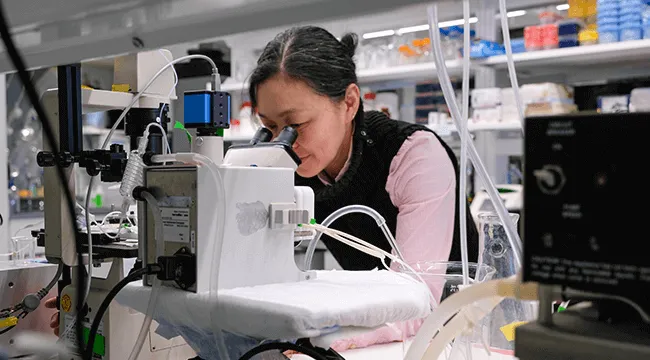George C. Wellman, Ph.D.
Dr. Wellman's research focuses on understanding signaling mechanisms contributing to enhanced cerebral constriction following cerebral aneurysm rupture and subarachnoid hemorrhage (SAH). Aneurysmal SAH occurs in approximately 30,000 people each year in the U.S. and is associated with high rates of morbidity and mortality. Current treatment strategies for this type of stroke are limited and do little to improve patient outcome.
Dr. Wellman's research combines a variety of experimental techniques to study how blood released onto the brain surface causes changes in electrical activity and calcium signaling leading to smooth muscle contraction.
His studies have revealed that subarachnoid blood can have profound effects on plasma membrane Ca2+ and K+ channel activity, as well as the frequency of intracellular Ca2+ release events (Ca2+ sparks). Dr. Wellman has also demonstrated fundamental changes in local and global calcium signaling within the neurovascular unit (neurons, astrocytes and parenchymal arterioles) of subarachnoid hemorrhage model animals.
Masayo Koide, Ph.D.
Dr. Koide's research focuses on cerebral blood flow regulation and cerebral small vessel function, particularly in the pathological conditions and diseases that lead to cognitive impairment in later life. The state-of-the-art approaches being used in the research include patch-clamp electrophysiology, ex vivo cerebral artery diameter measurement, ultrafast functional ultrasound blood flow imaging, and cognitive evaluation in animal models.
One of the ongoing projects is to elucidate the impact of aldosterone, a hormone that controls blood pressure, on the cerebral vasculature.
Excess plasma aldosterone (hyperaldosteronemia) impairs cerebral small vessel function and compromises cerebral blood flow regulation, even without changing blood pressure. These findings suggest that excess aldosterone may be a previously unappreciated "silent" risk factor for vascular dementia. The ultimate goal of the research is to develop therapeutic strategies to prevent vascular dementia.
Subarachnoid hemorrhage (SAH). Hemorrhagic strokes caused by cerebral aneurysm rupture severely limits blood flow to the brain, often leading to permanent neurological injuries or death. The only current proven treatment for post-SAH cerebral infraction is prophylactic oral nimodipine, which has limited benefit on patient's outcomes.
The lab has initiated a scientifically rigorous and reproducible approach for testing promising drug therapies for SAH, the Subarachnoid hemmorrhage Translational Advanced Research pre-Trial (START) Network. This network comprises three sites with experienced SAH researchers to address the challenges in translating animal studies to clinical trials.
Researching vascular dementia
An additional area of research for the Wellman-Koide Lab is small vessel disease leading to vascular dementia.
Excess plasma aldosterone (hyperaldosteronemia) impairs cerebral small vessel function and is an unappreciated "silent" risk factor for dementia. Aldosterone, our primary minerolocorticoid steroid hormone, plays an essential role in the kidney to maintain water-electrolyte balance and regulate blood pressure. However, elevated plasma aldosterone imparts significant cardiovascular and cerebrovascular health risks. Our studies elucidate the impact of hyperaldosteronemia on cerebral small vessel functions, centering on capillary-initiated vasodilatory signaling.

Learn more about our research:
.
Publication link - George C. Wellman, Ph.D. Publication link - Masayo Koide, Ph.D. Dr. George C. Wellman Dr. Masayo Koide R1 Learner Spotlight: Koide Lab Explores Links Between Blood Pressure Regulating Hormone and Cognitive Decline Fire Grant for researching dementia